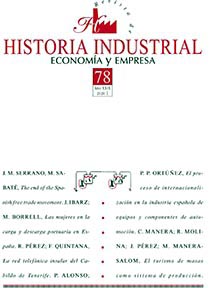Women in loading and unloading in Spanish ports from the 19th to the 20th centuries
DOI:
https://doi.org/10.1344/rhi.v29i78.29251Keywords:
women dock workers, occupational segregation, dock work, female unionismAbstract
Women were employed in the loading and unloading of cargo, towed barges, and piloted boats on waterways. However, this has been little considered in the specialized literature, both European and Spanish. At the end of the 19th century, women dock workers were important in the ports of La Coruña, Santander, and Bilbao. They were organized in unions and were involved in numerous and important strikes. The main objectives of this paper are to reconstruct the chronology of the presence of these women and their involvement in labor mobilization in the sector, and establish the circumstances of their disappearance after the First World War. This work focuses on the main ports of northern Spain, and opens a discussion about the characteristics and evolution of female work in a sector considered exclusively male. Essentially, this paper represents an initial interpretation on women dock workers in Spanish ports.
Downloads
Downloads
Published
How to Cite
Issue
Section
License
The author assigns all rights to the publisher. Creative Commons
The author who publishes in this journal agrees to the following terms:
- The author assigns all intellectual property rights exclusively to the publisher for the entire duration of the applicable intellectual property rights.
- The publisher will distribute the texts under the Creative Commons Attribution License, which allows others to share the work, provided that they acknowledge the authorship, its initial publication in this journal, and the conditions of the license.





